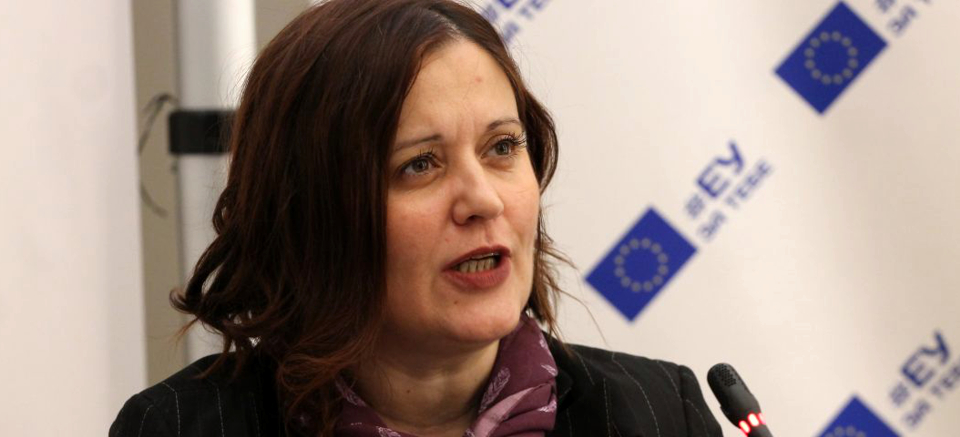Members of the police, social protection and judiciary institutions in Serbia and Montenegro commit to protect women from violence
Date:

Around 30 professionals working in the protection system in Montenegro and Serbia committed to improve the management of violence against women cases, especially in emergencies. This comes as a result of online seminars “The marginalization of the issue of violence against women under emergency circumstances, forced isolation and restrictive measures,” organized by Centre of Women’s Rights, within UN Women’s regional programme “Implementing Norms, Changing Minds,” funded by the European Union.
A series of online seminars in Montenegro and Serbia aimed to raise awareness among police, social protection and judiciary representatives about how to prevent the neglect of violence against women cases under emergency and restrictive measures, such as those enacted during COVID-19. The seminars were organized based on the recommendations of the research “Is justice failing women survivors of violence? Action-oriented recommendations for effective prevention, protection and prosecution in the Western Balkans and Turkey,” published in Phase I of the regional programme.
Following the seminars, participants will contribute to drafting regional guidelines for risk assessment and risk management to prevent the recurrence and escalation of violence against women.
“We have connected professionals from different parts of the countries and institutions, provided them with space for dialogue and exchange of practices, and helped them coordinate in order to address current problems while working on cases of violence against women,” stated Meliha Sendić, trainer and president of the Center of Women’s Rights.
In addition to learning about the different forms of violence and their consequences, participants discussed many dramatic life changes they themselves have experienced, as well as challenges they encountered due to changes in their usual workflow, that made it impossible to prevent or end violence.
Many of them mentioned the challenges they faced while managing cases of violence against women during the COVID-19 pandemic, including insufficient specialist staff to exclusively manage these cases and a lack of multisectoral cooperation, especially in social work centers where it is difficult to understand who manages a particular case. Also, their efforts to provide protection and support to women exposed to violence were hampered by inconsistent, non-comprehensive and non-uniform risk assessment from certain institutions.
“I was selected as a prosecutor specialized in working with women who suffered from violence. There is a lack of prosecutors with such specialized knowledge and I cannot cover all the cases by myself. In addition to cases of domestic violence, other prosecutors and I are working on other cases. There should be many more prosecutors with increased sensitivity and understanding. Thanks to these seminars, I changed my attitude towards the way we should handle violence against women cases,” stated Jelena Protić, basic state prosecutor’s office from Montenegro.
Participants identified the need to develop individual safety plans for at-risk women to help them exit a situation of violence, noting that safety plans should be developed by specialist NGOs and other service providers. They also recommended the establishment of special departments with specialized staff working exclusively on cases of domestic violence within the institutions in order to facilitate work in crisis situations.
Gorjana Mirčić Čaluković, deputy public prosecutor with 18 years of experience in the field of protection from domestic violence in Serbia, noted: “To more successfully address domestic violence cases, it is crucial to strengthen the coordination and cooperation of existing groups, more frequently involve health workers, and include representatives of the Gender Equality Body at the local level. The training session was an inspiration and reminder that we must not give up and continue to work to find new solutions and opportunities, especially now, in a pandemic.”
Based on the sharing of experiences and practices, the participants agreed that there is a need to develop a uniform risk assessment form in cases of domestic violence for all relevant institutions in the protection system in order to anticipate further steps to protect survivors and prevent severe violence. Ultimately, this point will serve as a recommendation for the regional guidelines.
“We are happy that all participants expressed support and readiness to contribute to the implementation of the recommendations that will be the basis for further work. In particular, they will focus on establishing departments within the institutions in the protection system which include certified professionals trained to handle violence against women cases and will advocate for the development and mandatory application of uniform risk assessment forms in cases of domestic violence for all relevant institutions in the protection system,” concluded the trainer Nurka Babovic.
Ivana Kulić, social worker, family counselor and licensed family mediator, employed for 12 years in social protection from Serbia, said: “When women protection specialists agree and unite, change is in sight. You just have to persevere.”